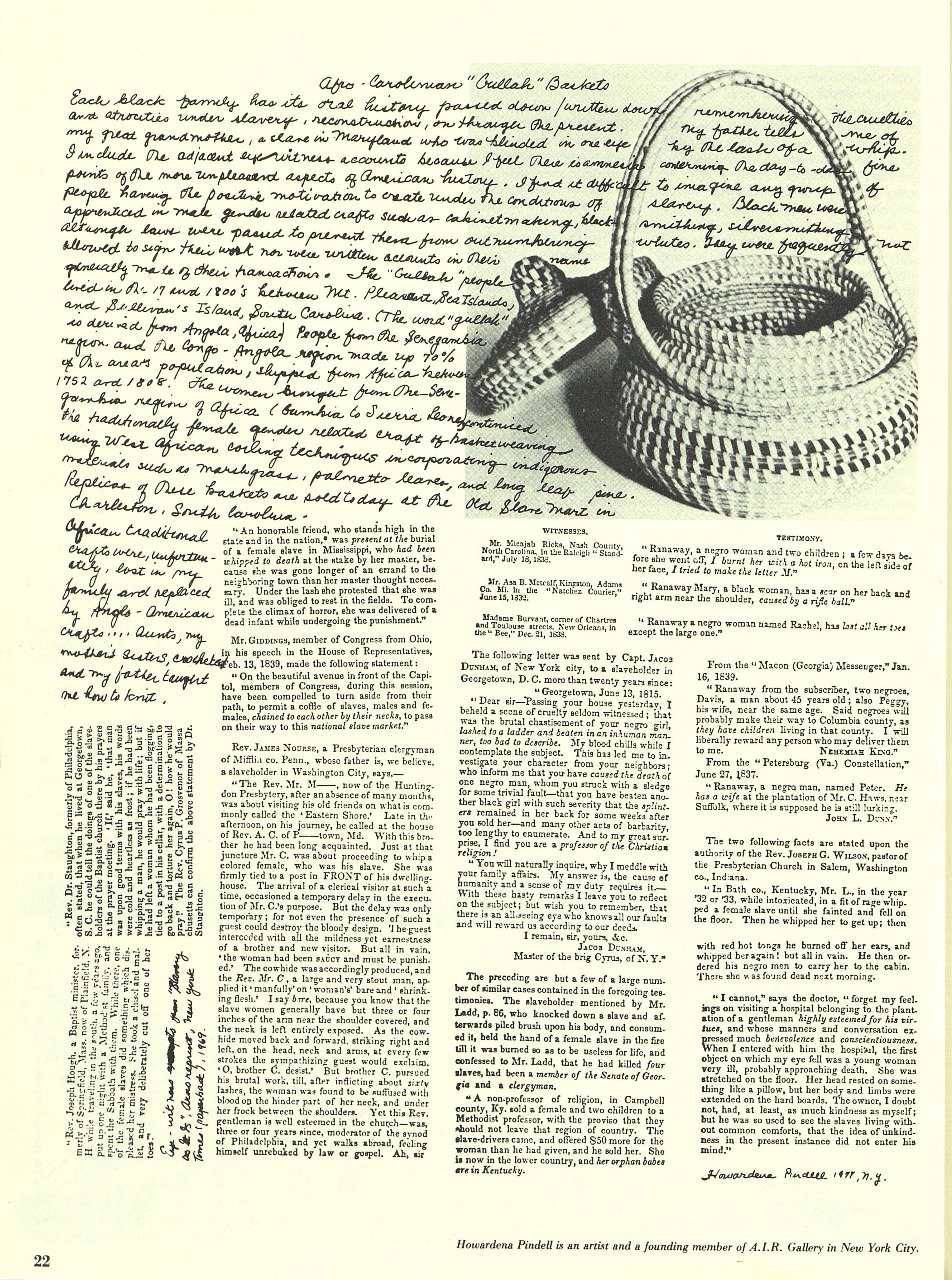Each black family has its oral history passed down / written down remembering the cruelties and atrocities under slavery, reconstruction, on through the present. My father tells me of my great grandmother, a slave in Maryland who was blinded in one eye by the lash of a whip. I include the adjacent eyewitness accounts because I feel there is amnesia concerning the day-to-day fine points of the more unpleasant aspects of American history. I find it difficult to imagine any group of people having the positive motivation to create under the conditions of slavery. Black men were apprenticed in male gender related crafts such as cabinetmaking, blacksmithing, silversmithing although laws were passed to prevent them from outnumbering whites. I say were frequently not allowed to sign their work nor were written accounts in their name generally made of their transactions. The "Gullah" people lived in the 17 and 1800's between Mt. Pleasant, Sea Islands, and Sullivan's Island, South Carolina. (The word "gullah" is derived from Angola, Africa.) People from the Senegambia region and the Congo-Angola region made up 70% the area's population, slipped from Africa between 1752 and 1808. The women brought from the Senegambia region of Africa (Gambia to Sierra Leone) continued the traditionally female gender related craft of basketweaving usng West African coiling techniques incorporating indigenous materials such as marshgrass, palmetto leaves, and long leaf pine. Replicas of these baskets are sold today at the Old Slave Mart in Charleston, South Carolina.
African traditional crafts were, unfortunately, lost in my family and replaced by Anglo-American crafts.... Aunts, my mother's sisters, crocheted and my father taught me how to knit.
"An honorable friend, who stands high in the state and in the nation," was present at the burial of a female slave in Mississippi, who had been whipped to death at the stake by her master, because she was gone longer of an errand to the neighboring town than her master thought necessary. Under the lash she protested that she was ill, and was obliged to rest in the fields. To complete the climax of horror, she was delivered of a dead infant while undergoing the punishment."
Mr. GIDDINGS, member of Congress from Ohio, his speech in the House of Representatives, Feb. 13, 1839, made the following statement: "On the beautiful avenue in front of the Capitol, members of Congress, during this session have compelled to turn aside from their path, to permit a coffle of slaves, males and females, chained to each other by their necks, to pass on their way to this national slave market."
Rev. JAMES NOURSE, a Presbyterian clergyman of Mifflin co. Penn., whose father is, we believe, a slaveholder in Washington City, says—"The Rev. Mr. M—, now of the Huntingdon Presbytery, after an absence of many months, was about visiting his old friends on what is com- monly called the 'Eastern Shore.' Late in the afternoon, on his journey, he called at the house of Rev. A. C. of P—town, Md. With this brother he had been long acquainted. Just at that juncture Mr. C. was about preceeding to whip a colored female, who was his slave. She was firmly tied to a post in FRONT of his dwelling house. The arrival of a clerical visitor at such time, occasioned a temporary delay in the execution of Mr. C.'s purpose. But the delay was only temporary; for not even the presence of such a guest could destroy the bloody design. The guest interceded with all the mildness yet earnestness of a brother and new visitor. But all in vain, 'the woman had been SAUCY and must be punished.' The cowhide was accordingly produced, and the Rev. Mr. C, a large and very stout man, applied it 'manfully'on 'woman's' bare and 'shrinking flesh.' I say bare, because you know that the slave women generally have but three or four inches of the arm near the shoulder covered, and the neck is left entirely exposed. As the cowhide moved back and forward, striking right and left, on the head, neck and arms, at every few strokes the sympathizing guest would exclaim, 'O, brother C. desist.' But brother C. pursued his brutal work, till, after inflicting about sixty lashes, the woman was found to be suffused with blood on the hinder part of her neck, and under her frock between the shoulders. Yet this Rev. gentleman is well esteemed in the church—was, three or four years since, moderator of the synod of Philadelphia, and yet walks abroad, feeling himself unrebuked by law or gospel. Ah, sir.
The following letter was sent by Capt. JACOB DUNHAM, of New York City, to a slaveholder in Georgetown, D.C. more than twenty years since: "Georgetown, June 13, 1815.
"Dear sir—Passing your house yesterday, I beheld a scene of cruelty seldom witnessed; that was the brutal chantisement of your negro girl, lashed to a ladder and beaten in an inhuman manner, too bad to describe. My blood chills while I contemplate the subject. This has led me to investigate your character from your neighbors; who inform me that you have caused the death of one negro man, whom you struck with a sledge for some trivial fault—that you have beaten another black girl with such severity that the splinters remained in her back for some weeks after you sold her—and many other acts of barbarity, too lengthy to enumerate. And to my great surprise, I find you are a professor of the Christian religion!
"You will naturally inquire, why I meddle with your family affairs. My answer is, the cause of humanity and a sense of my duty requires it.— With these hosty remarks I leave you to reflect on the subject; but wish you to remember, that there is an all-seeing eye who knows all our faults and will reward us according to our deeds. I remain, sir, yours, &c. JACOB DUNHAM, Master of the brig Cyrus, of N. Y."
The preceding are but a few of a large number of similar cases contained in the foregoing testimonies. The slaveholder mentioned by Mr Ladd, p. 86, who knocked down a slave and afterwards piled brush upon his body, and consumed it, held the hand of a female slave in the fire till it was burned so as to be useless for life, and confessed to Mr. Ladd, that he had killed four slaves, had been a member of the Senate of Georgia and a clergyman.
"A non-professor of religion, in Campbell county, Ky. sold a female and two children to a Methodist professor, with the proviso that they should not leave that region of country. The slave-drivers came, and offered $50 more for the woman than he had given, and he sold her. She is now in the lower country, and her orphan babes are in Kentucky.
From the "Macon (Georgia) Messenger," Jan. 16, 1839.
"Ranaway from the subscriber, two negroes, Davis, a man about 45 years old; also Peggy, his wife, near the same age. Said negroes will probably make their way to Columbia county, as they have children living in that county. I will liberally reward any person who may deliver them to me. NEHEMIAH KING."
From the "Petersburg (Va.) Constellation," June 27, 1837.
"Ranaway, a negro man, named Peter. He has a wife at the plantation of Mr. C. Haws, near Suffolk, where it is supposed he is still lurking.
JOHN L. DUNN."
The two following facts are stated upon the authority of the Rev. Joseph G. Wilson, pastor of the Presbyterian Church in Salem, Washington co., Indiana.
"In Bath co., Kentucky, Mr. L., in the year '32 or '33, while intoxicated, in a fit of rage whipped a female slave until she fainted and fell on the fioor. Then he whipped her to get up; then with red hot tongs he burned off her ears, and whipped her again! but all in vain. He then ordered his negro men to carry her to the cabin. There she was found dead next morning.
"I cannot," says the doctor, "forget my feelings on visiting a hospital belonging to the plantation of a gentleman highly esteemed for his virtues, and whose manners and conversation expressed much benevolence and conscientiousness. When I entered with him the hospital, the first object on which my eye fell was a young woman very ill, probably approaching death. She was stretched on the floor. Her head restored on something like a pillow, but her body and limbs were extended on the hard hoards. The owner, I doubt not, had, at least, as much kindness as myself; but he was so used to see the slaves living without common comforts, that the idea of unkindness in the present instance did not enter his mind.'
Howardena Pindell 1974, N.Y.
"Rev. Joseph Hough, a Baptist minister, formerly of Springfield, Mass, now of Plainfield, N.H. while traveling the south, a few years ago, put up one night with a Methodist family, and spent the Sabbath with them. While there, one of the female slaves did something which displeased her mistress. She took a chisel and mallet, and very deliberately cut off on eof her toes."
"Rev. Dr. Staughton, formerly of Philadelphia, often stated, that when he lived at Georgetown, S.C. he could tell the doings of one of the slaveholders of the Baptist church there by his prayers, at the prayer meeting. 'If,' said he, 'that man was upon good terms with his slaves, his words were cold and heartless as frost; if he had been whipping a man, he would pray with life; but if he had left a woman whom he had been flogging, tied to a post in his cellar, with a determination to go back and torture again, O! how he would pray!' The Rev. Cyrus P. Grosvenor of Massachusetts can confirm the above statement by Dr. Staughton.
Howardena Pindell is an artist and a founding member of A.I.R. Gallery in New York City

